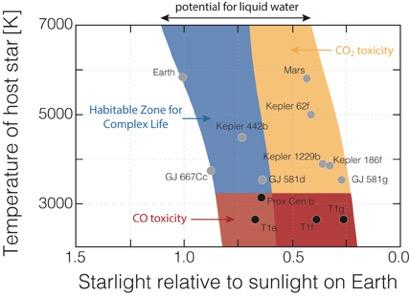Scientists may need to rethink their estimates for how many planets outside our solar system could host a rich diversity of life.
In a new study, a UC Riverside–led team discovered that a buildup of toxic gases in the atmospheres of most planets makes them unfit for complex life as we know it.
Traditionally, much of the search for extraterrestrial life has focused on what scientists call the “habitable zone,” defined as the range of distances from a star warm enough that liquid water could exist on a planet’s surface. That description works for basic, single-celled microbes — but not for complex creatures like animals, which include everything from simple sponges to humans.

The team’s work, published today in The Astrophysical Journal, shows that accounting for predicted levels of certain toxic gases narrows the safe zone for complex life by at least half — and in some instances eliminates it altogether.
To read more, click here.